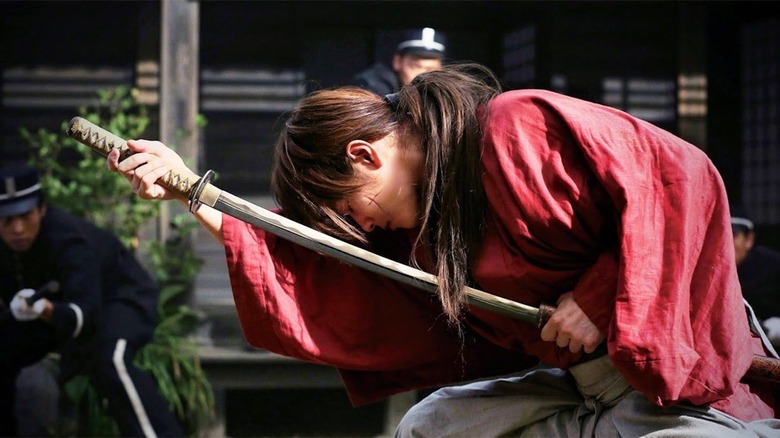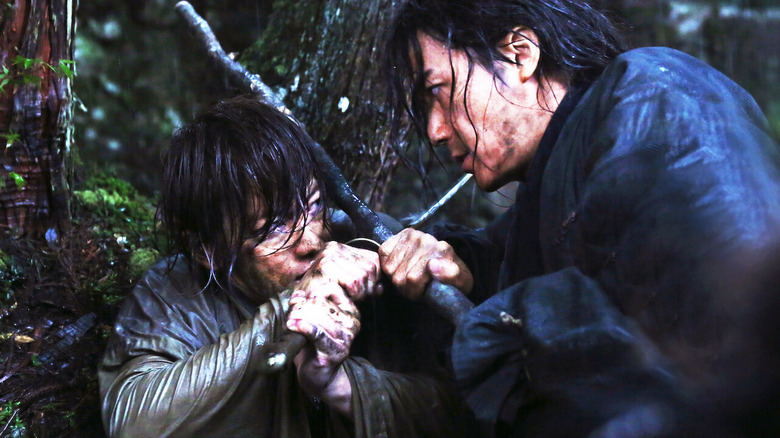The Daily Stream: The Rurouni Kenshin Trilogy Brings The Western-Samurai Dynamic Full Circle
(Welcome to The Daily Stream, an ongoing series in which the /Film team shares what they've been watching, why it's worth checking out, and where you can stream it.)
The Movies: Rurouni Kenshin Part 1, Part 2 & Part 3
Where You Can Stream It: Funimation
The Pitch: A former assassin nicknamed Hitokiri Battosai lays down his sword after committing countless atrocities during the Bakumatsu war and vows to never kill again. Ten years later, a wandering rurouni named Himura Kenshin (Takeru Satoh) makes his way through the Japanese countryside, offering protection and help to those in need. But he carries a strange sword: one with a blunt tip and the cutting edge on the wrong side — literally, a sword that cannot kill. But he's inevitably drawn back into the world of violence — whether by a copycat killer posing as the Battosai, or by a former fellow assassin with a vendetta against Kenshin and the Meiji government that had hired both of them do their dirty work.
Why It's Essential Viewing
Hollywood has been trying so hard to capitalize on the anime craze, with multiple adaptations of Japanese anime or manga stories landing with a thud. But in all the time that they have been trying to perfect the anime adaptation, Hollywood doesn't realize that the best anime adaptation has already been made. Though it took three movies (and then some) to do it.
In "Rurouni Kenshin" and its sequels "Rurouni Kenshin Part 2: Kyoto Inferno" and "Rurouni Kenshin Part 3: The Legend Ends," director Keishi Otomo adapts the samurai manga of the same name by Nobuhiro Watsuki — recently returning to finish the job with the duology "Rurouni Kenshin: The Beginning" and "Rurouni Kenshin: The Final." But it was in that first trilogy of films, which were released between 2012 to 2014, that we saw that rare alchemy of an anime story becoming perfectly attuned to the live-action medium.
What's the biggest problem with adapting an anime to live-action? Is it the absurd, over-the-top characters? The absurdly large swords? Or having to compress the absurdly imaginative and wild premises into something as limiting as reality? Anime exists in a heightened state to begin with, so trying to inject some kind of realism into the stories seems impossible. But in a story like "Rurouni Kenshin," for which Watsuki drew on real-life historical figures and based in the politically turmoiled backdrop of Japan in the early Meiji era (circa 1870s), there is a level of grounding already present in the story. Then you add the cultural history behind samurai cinema, which — largely through the works of Akira Kurosawa — became their own visual language, even crossing over to impact Hollywood with Westerns, then with genre flicks. "Rurouni Kenshin," whether intentionally or not, soaks all of this in and turns out something awesome. It's a samurai movie, and it's also a Western, but it's also a superhero story. It's a byproduct of all these things, but at its heart, it's incredibly, wonderfully anime.
Many elements came together to create this lighting in a bottle: Otomo's energetic, striking direction, the incisive fight choreography by Hong Kong-trained Kenji Tanigaki (in one of the most recent movies, he's got Kenshin attacking people with a sword in his teeth!), the decision to frame Himura Kenshin as a lovable superhero (with only lightly dyed hair instead of the bright red of the manga/anime) in a samurai-Western movie. But it really comes down to the perfect casting of Takeru Satoh as Kenshin, who has to play the very hard balancing act of the fool and the hardened warrior, and make them both believable. He becomes the perfect heart of these movies, which — as overstuffed and over-the-top as they can get — keep you invested in the journey of the wandering rurouni who only wants to protect people.

